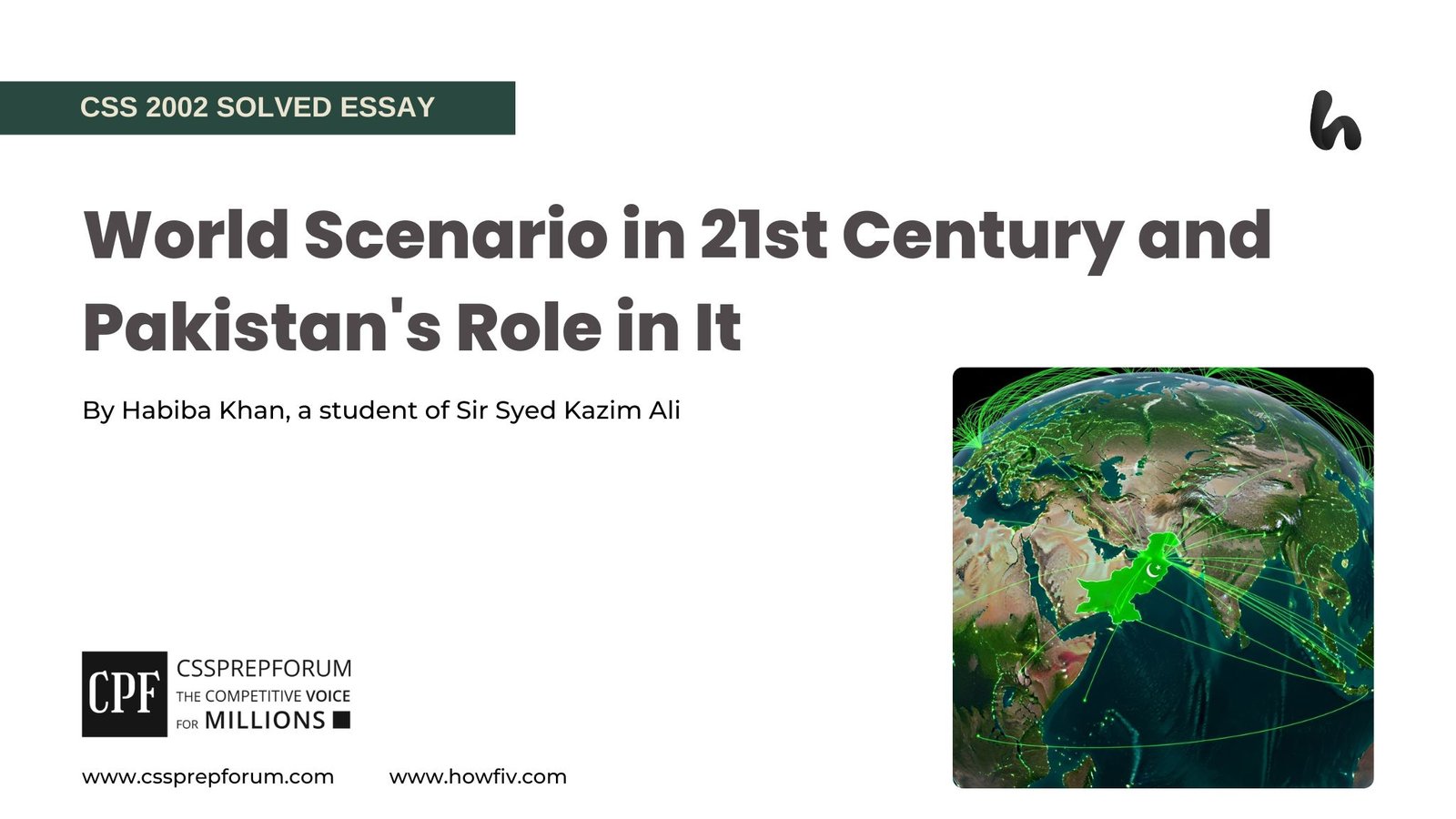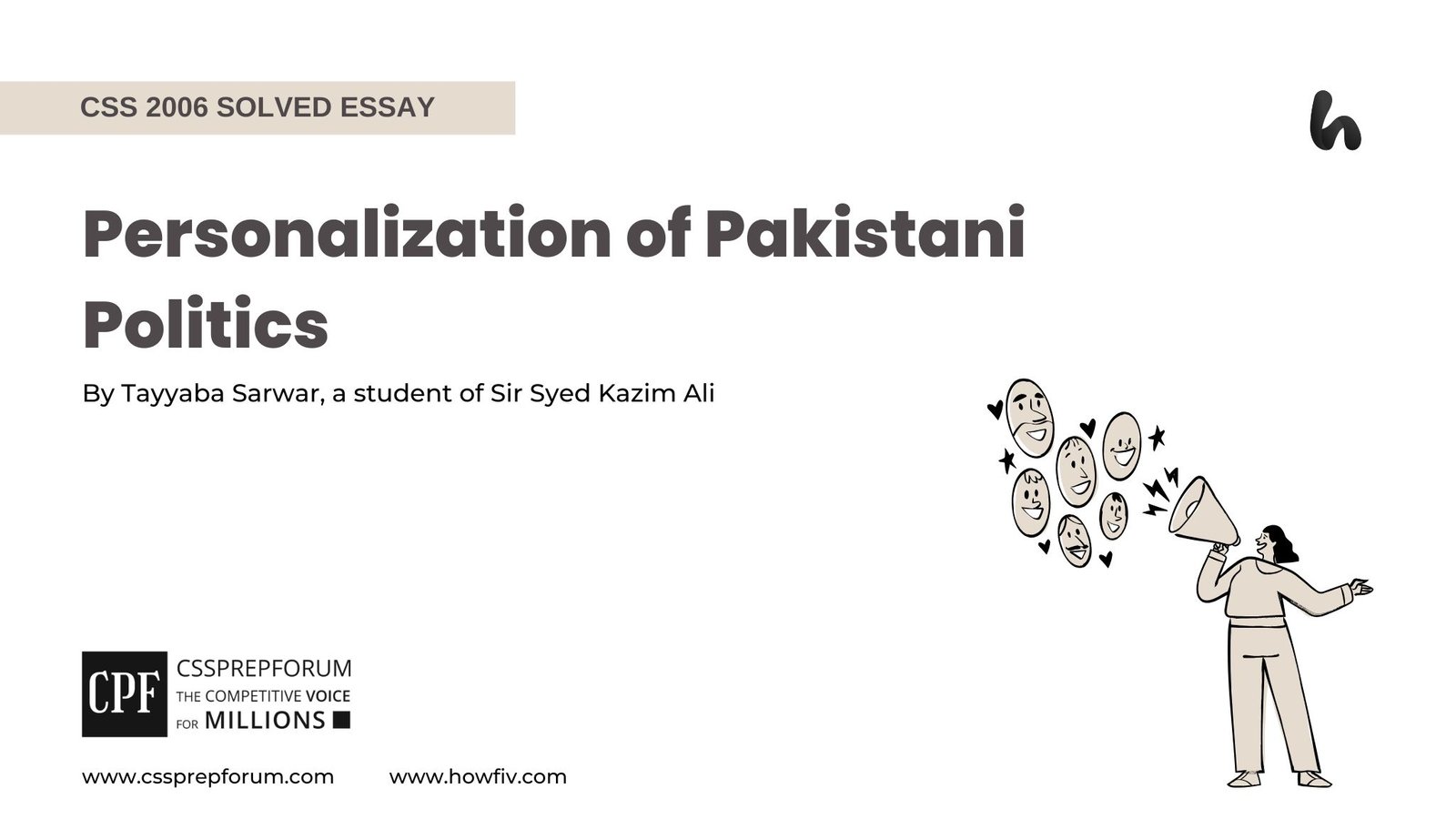PMS 2017 Solved Pakistan Affairs Past Papers | Write a Short Note on Economic Cooperation Organization
The following question of PMS Pakistan Affairs 2017 is solved by Miss Iqra Ali, the best Pakistan Affairs Coach, on the guided pattern of Sir Syed Kazim Ali, which he taught to his students, scoring the highest marks in compulsory subjects for years. This solved past paper question is uploaded to help aspirants understand how to crack a topic or question, how to write relevantly, what coherence is, and how to include and connect ideas, opinions, and suggestions to score the maximum.

Outline
1-Introduction
2- Historical Background of Economic Cooperation Organization
3-Objectives of ECO
4-Achievements of ECO
- ✓ECO-Transit Transport Framework Agreement
- ✓Cooperation on Regional Projects
- ✓Reconstruction and Development of Afghanistan
- ✓Establishment of Trade and Development Bank
- ✓Tourism Sector Development
5-Challenges with ECO
- ✓Trade potential of ECO not Harnessed
- ✓Lack of Conducive Business Setting
- ✓Economic Sanctions and Regional Stability
- ✓Security of ECO States
6-Way Forward
- ✓Implementing ECOTA Agreement
- ✓Partnering with Global and Regional bodies
- ✓Developing Huge Human Capital
- ✓Operationalizing of ECO Science Fund (ECO-SF)
- ✓Expanding Membership
7-Conclusion

Answer to the Question
Introduction
The Economic Cooperation Organization (ECO) is an intergovernmental organization that promotes economic cooperation and regional integration. It fosters transit trade connectivity and works to boost the economic potential of the entire ECO region. The organization has achieved significant milestones in its 39-year lifespan. The member states have signed the ECO Transit Transport Framework Agreement aimed to bolster intra-regional connectivity; as a result, many successful projects, like the Istanbul-Tehran-Islamabad road and rail network, can be seen benefiting the region. Moreover, an increased cooperation between the member states on regional projects, the Trans-Afghanistan railway project and the Turkmenistan-Afghanistan-Pakistan-India (TAPI) natural gas project, has contributed to the chances of success of these projects. However, the organization is marred with a few challenges, like the non-agreement of member states on region’s trade agreement, ECOTA, the security situation of the a few member states, and the instability in Afghanistan, which are casting its shadow on region’s economic performance. Nonetheless, the region can harness its true potential by implementing ECOTA trade agreement between the member states, partnering with regional and international bodies to learn their best practices, developing the region’s vast youth population and expanding the membership of the organization to the emerging economies in Asia. In a nutshell, the region, despite challenges, has the potential to prosper and succeed like the EU if the aforementioned challenges are addressed with the strong political will of member states.
Historical Background of Economic Cooperation Organization
ECO was established in 1985 and it is a successor organization of Regional Cooperation Development (RCD), which was established in 1964 by Pakistan, Iran and Turkey and was later dissolved in 1979 after the Iranian Revolution. ECO is actually an attempt to revive RCD. The organization started with only three member states, Pakistan, Turkey, and Iran- also the only member states of RCD- and then expanded to include Azerbaijan, Afghanistan, and all five Central Asian states, totaling 10 members. The aim of the league is to foster economic prosperity in the region through trade, energy, connectivity, tourism, and cultural cooperation. The region represents 8 million people or 6.6% of the global population, with its location at the core of the world’s heartland bordering Russia, China, the Indian Ocean, the Persian Gulf and the Caspian Basin. The region is endowed with natural resources, an unmatched strategic location, and an immensely rich linguistic, philosophical, and cultural lineage. Over the years, the organization has taken major initiatives in trade, energy, connectivity, tourism, and cultural, social and scientific development to further its delineated aims.

Objectives of ECO
ECO is established with a few objectives, all aimed at collective economic progress of the 10 member states. The objectives of the alliance are as follows:
- To assist in the economic development of member states
- To progressively cut off trade barriers and promote international trade
- To develop transport infrastructure linking member states with each other and outside the world
- To liberalize the economy and follow privatization
- To mobilize ECO’s region material resources and its utilization
- To effectively use the agricultural and industrial potential of ECO’s region
- To inhibit drug abuse, ecological and environmental protection, and strengthen historical and cultural ties among the people of ECO’s region
Achievements of ECO
Since its establishment, ECO has achieved significant milestones, all contributing towards collective prosperity of the ECO region. Some of the achievements of the ECO are as follows:
- ECO-Transit Transport Framework Agreement
Since it was signed off in 2006, it is contributing towards a transit-route approach towards trade and transit connectivity. It is collaborating with the Islamic Development Bank to execute the regional connectivity-related projects. The first success was achieved when the Islamabad-Tehran-Istanbul road corridor was operationalized. On 7 October 2021, two cargoes were dispatched from Karachi, Pakistan, to Türkiye and Azerbaijan, each under the TIR Convention. Since then, several cargoes have been operating successfully on the corridor. Furthermore, the Islamabad-Tehran-Istanbul Rail Corridor has also resumed its operations in 2022. Moreover, additional projects between the member states are underway, like the Kyrgyzstan-Tajikistan-Afghanistan-Iran (KTAI) road corridor, Kazakhstan-Turkmenistan-Iran (KTI) railway corridor and Pakistan-Iran-Turkmenistan (PIT) transport corridor. All these projects aim to increase intra-regional connectivity and access to seas.
- Cooperation on Regional Projects
The ECO member states have signed several bilateral and multi-lateral agreements. For instance, CASA-1000 is a project between the Central Asian nations Kyrgyzstan and Tajikistan and the South Asian nations Pakistan and Afghanistan. The two Central Asian nations have abundant clean hydropower energy resources in summer due to the rainfall and excessive water flowing from mountains, resulting in surplus electricity generated. However, its neighbors, Afghanistan and Pakistan, suffer a lot in the sweltering months of summer. So a transmission network is aimed to be set up under the CASA 1000 project, which will provide electricity at an affordable rate from the two Central Asian nations to the energy-struggling Pakistan and Afghanistan. Additionally, member states are also cooperating in the Trans-Afghanistan railway project, also known as the Uzbekistan-Afghanistan-Pakistan Railway project and the Turkmenistan-Afghanistan-Pakistan-India natural gas project, commonly named the TAPI-gas pipeline, reflecting member states’ increased cooperation in regional connectivity initiatives.
- Reconstruction and Development of Afghanistan
The ECO has always been aware of developments in Afghanistan as being its member state and has voiced its full support for a stable and prosperous Afghanistan. It established the Special Fund for Afghanistan in 2004 for humanitarian assistance. Additionally, an Advocacy Program for Afghanistan (2017) was created to help establish infrastructure, build capacities, and promote trade, tourism and cooperation in customs-related matters. Moreover, the ECO Special Conference on Afghanistan (2022) passed a unanimous resolution to initiate practical steps to bring peace and stability to the country. ECO has always participated in talks on Afghanistan organized by the United Nations (UN) and has always proposed economic and humanitarian assistance measures to avoid a humanitarian crisis in Afghanistan.
- Establishment of ECO Trade and Development Bank
The organization’s Trade and Development Bank is a source of financial capital for the member countries to promote intra-regional trade, sustainable economic development efforts, renewable energy efforts and private and public sector investments. For instance, the organization has made investments of around $1 billion in different valuable sectors of the economy in Pakistan, like renewable energy, trade, manufacturing and micro-finance. Moreover, the organization has also extended a trade-finance loan to the country for financing oil and gas imports in 2022. Similarly, the bank has allocated a EUR 20 Million Trade Finance loan to Vestel Elektronik Sanayi ve Ticaret A.Ş. for the financing of the exports of the company from Türkiye. In short, the bank is a symbol of financial support for the member states of the ECO.
- Tourism Sector Development
The region of ECO is blessed with natural beauty and is home to 86 UNESCO World Heritage Sites, echoing the memories of the ancient Silk Route and the ancient culture of the region. Taking the significant potential of the region in this area, it has been placed on ECO Vision 2025 agenda. In 2023, at ECO’s Ministerial Meeting on Tourism in Iran, the Ardabil Declaration was adopted that recognized the significance of sustainable tourism development in social and economic dimensions and committed to the enhancement of the region’s tourism potential. ECO has also devised a plan to annually appoint an ECO member state, recognized for its rich historical heritage and great tourism potential, as ECO’s tourism capital to facilitate sustainable development of tourism and to boost the host economy. Moreover, ECO Tour Operator’s Network is also established to help member states attract tourists to different tourist destinations in the ECO region. For instance, in 2022 alone, the ECO region hosted 70 million tourists from all across the globe. All these measures on the part of ECO Tourism agenda have bolstered the tourism potential of the region, contributing a lot to region’s economy.
Challenges of ECO
- The trade potential of the ECO region not harnessed
Though the member states signed a trade agreement in 2003, which came into force in 2008, only 5 states have ratified the agreement and are waiting for the willingness of the other 5 members. As a result, the tariff concessions that could have been availed under the ECOTA agreement are in limbo for 16 years now. As a result, the intra-regional trade accounts for only 8% of the region’s total trade.
- Lack of conducive business setting
The rising cost of business in the ECO region, the presence of Non-Tariff Barriers (NTBs), the lack of significant economic complementarities, capital deficiency and weak industrial base have hampered the region’s business potential.
- Economic Sanctions and Regional Instability
Economic sanctions on a nation that is part of ECO also cost ECO’s performance viz-a-viz its objectives. Sanctions on Iran by the United States have hampered the economic growth of the region. Additionally, instability in Afghanistan also plays an important role in damaging the economic potential of the region.
- Security of ECO states
ECO member states are facing security concerns, which hampers their potential in cooperating with other member states in trade, investment, energy and cross-border connectivity. For instance, Pakistan is itself engaged in its fight against non-state actors that have hampered its economic potential. Additionally, in the changing world’s geopolitics, Iran stands as a strong and more vocal rival of the US and Israel than ever; as a result, a possibility of regional escalation is not a distant dream. So, these member states have been stuck in their own security dilemmas, thwarting the achievement of ECO’s objectives through the spirit of collective engagement.
Way Forwards
- Implementing ECOTA agreement
The member states should gather consensus on the ECOTA agreement as it is a key to fulfill one of the important objectives of ECO, which is to boost intra-region. The agreement will allow trade with each other’s goods with little to no tariffs imposed on them. This will, in turn, significantly boost the economic potential of all countries in the region.
- Partnering with global and regional bodies
The organization needs to coordinate and partner with other regional or global organizations, like the European Union or the Association of Southeast Asian Nations (ASEAN), to learn best practices and shape ECO in the same manner to become a ray of hope for the region.
- Developing Huge human capital
There is a need for the member states to cooperate in efforts to promote skill development efforts of the huge bulk of youth, which will transform this bulge into an economic asset for the region and will significantly add to the region’s economic prosperity.
- Operationalizing ECO Science and Technology Fund
Member states should make an open and generous contribution to the Science and Technology Fund, which is established under an ECO specialized body, ECO Science Foundation, operating in Pakistan. The body is mandated with carrying out scientific, technological, and innovative research to fill the research gap in the region. The organization aims to align the region with the world in the science and technology race.
- Expanding membership
As the dynamics are evolving in Asia and new economies are emerging, there is a need to expand the membership of the organization to incorporate such nations, which will not only increase the economic resources of the organization but also the region’s political influence in the world, like the EU or ASEAN. So, expanding membership also bears immense potential for the organization to grow and prosper.
Conclusion
ECO, a regional alliance of 10 member states, bears great potential in altering the economic outlook of the region and boosting regional integration. The organization has, in the past, made significant milestones, such as ECO-Transit Transport Framework Agreement that is contributing towards intra-regional connectivity, and the establishment of Trade and Development Bank that is benefitting the member states financially, and can contribute to regional economic prosperity in the future, too, with a strong cooperation and political will of the member states. In spite of challenges in its way, the organization can truly play an instrumental role in the development of the region by removing trade barriers, learning best practices of the successful regional or international alliances, and developing the human resource of the region.

CSS Solved Past Papers’ Essays
Looking for the last ten years of CSS and PMS Solved Essays and want to know how Sir Kazim’s students write and score the highest marks in the essays’ papers? Then, click on the CSS Solved Essays to start reading them.
CSS Solved Essays
CSS Solved General Science & Ability Past Papers
Want to read the last ten years’ General Science & Ability Solved Past Papers to learn how to attempt them and to score high? Let’s click on the link below to read them all freely. All past papers have been solved by Pakistan’s top CSS GSA coach having the highest score of their students.
General Science & Ability Solved Past Papers












